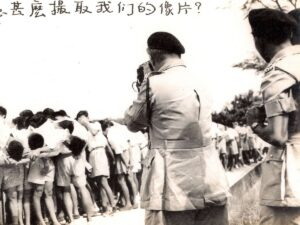In a recent lunch conversation with a friend of mine, we chanced upon the topic of opposition members of parliament in Singapore, a rarity in our one-party-ruled country. “It all started with J.B. Jeyaretnam and Chiam See Tong,” I remarked, to which my friend responded with a quizzical stare, “who are they?”
His ignorance of these individuals (pioneering opposition members of parliament) is hardly unsurprising considering how the grand state narrative of the ruling political party leading this city-state from rags to riches is often propagated as the only historical narrative that truly matters. After all, in a country that prides itself for its pragmatism, what is the use of remembering other, smaller historical narratives?
It is this very act of remembering by voices which lie outside the frame of Singapore’s grand state narrative that Tan Pin Pin foregrounds in her film Invisible City (2007). Taking on the form of a documentary, Tan’s film features individuals obsessed with remembering: including an English doctor who underwent brain surgery who hoards a large trove of film footage of Singapore before its independence in 1965, an archaeologist in the process of excavating artifacts from an old Japanese fort, and a former journalist eager to repair the reputation of politically active Chinese students in the 50s among several others. In one of their exchanges, the archaeologist, Lim Chen Sian, asks Tan Pin Pin, “If (a record of something) doesn’t survive, does it mean it never happened?” Lim’s question succinctly captures the spirit of Tan’s film — the constructed nature of history and the significance of remembering. What does it mean for the past to be remembered and how is such remembrance represented?
Key to Tan’s film is its form as a documentary, or, as she describes it on her blog, “a documentary about documenteurs.” While documentaries typically portray themselves as truth – or at least something somewhat close to the truth based on objective, empirical evidence – Invisible City actively resists portraying itself as such. By choosing the process of documentation as the subject of the film, Tan shines a spotlight on her film’s own constructed nature. In doing so, Tan invites the viewer to contemplate the fallibility of any memory, any story, any History that presents itself as True with a capital T.
The film’s self-awareness of its constructed nature is further accentuated through various intentional editing choices, such as the omission of subtitles whenever a white person speaks, positioning the white voice as the primary voice. This achieves two main effects. Firstly, it is a stab at how Singapore’s history typically romanticises and venerates our colonial past. Secondly, it is a clear indicator to the viewer that the ‘documentary’ they are watching is not unfiltered. It’s in fact heavily edited and constructed to produce a particular narrative. No narrative can exist without the process of its construction; no narrative can ever be a completely unadulterated representation of the historical past.
Invisible City is best appreciated in its local context considering how history in Singapore is heavily constructed by the state. The Singapore Story of how our first Prime Minister Lee Kuan Yew along with the incumbent People’s Action Party won the country’s independence and brought it from a fishing village to a prosperous metropolis is a narrative that is heavily policed and protected at all costs. Any attempts to propose alternative narratives are quickly drowned out by the sheer scale at which this grand state narrative is propagated in schools and through state media. Should any of these attempts appear to undermine the Singapore Story, the state would not hesitate to erase any trace of it. One such example would be another of Tan Pin Pin’s films, To Singapore, With Love (2013), which was banned as it was deemed a national security threat. The anecdote at the beginning of this review is testament to the success of the propagation of the one true Singapore Story.
In an interview with Senses of Cinema, Tan was asked about Singaporeans’ apathy towards the state’s control over the country’s historical narrative. She responded, “How can you just sit there? So why have my countrymen been seen to be so particularly docile in all these matters that seem so important to others? Is it because they don’t know about it? We have lost our voice and tragically, we don’t know it. We may not even know what it feels like to have one.” With the state doing all the remembering for us, we have forgotten what it means to remember, what the process of remembering looks like. How can one have a voice when there is nothing left to recall but what has already been recalled for us over and over again?
At the end of the film, ex-journalist and historian Han Tan Juan quoted 18th century German philosopher Hegel,
If something is not reasonable, it will not exist. If something really does not have a reason to exist, it starts disappearing from existence.
Alternative accounts of Singapore’s history are disappearing from the collective consciousness because we are told there is no reason for them to exist. Tan Pin Pin’s Invisible City argues otherwise, calling upon its viewers to question what it means to remember, to remember for themselves instead of letting someone else do the remembering for them, to regain the voice we have lost.
Where to Watch: Vimeo

